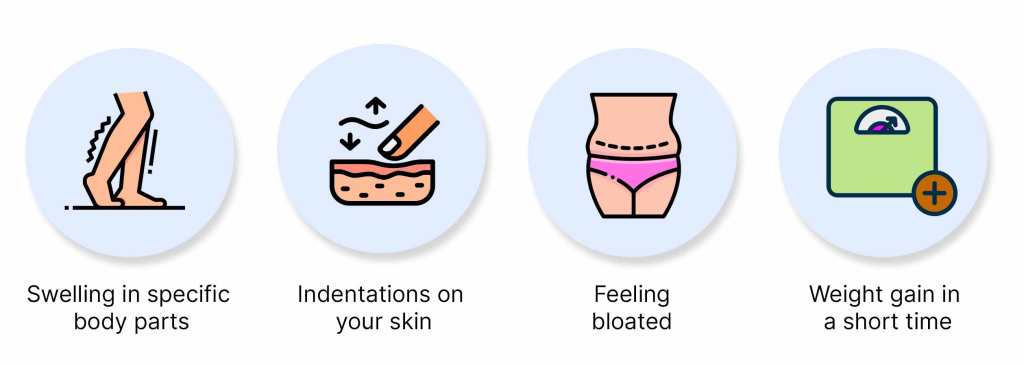Understanding Water Weight

[Source: blog.cult.fit]
Water weight is a common yet frequently misunderstood aspect of body composition. Your body’s water content plays a crucial role in various bodily functions, with water typically comprising 50 to 60 percent of an adult’s total body weight [#1]. This natural water balance can fluctuate significantly throughout the day.
What is Water Weight?
Water retention occurs when your body holds onto extra fluid beyond its immediate needs [#2]. This excess fluid can cause noticeable changes in your appearance and weight. In fact, these fluctuations can be quite dramatic – your body weight may vary by 1-5 pounds within a single day due to water retention alone .
Identifying Water Weight
Recognizing water weight can help you better understand your body’s patterns. Common indicators include:
- Sudden weight changes, especially rapid gains
- Swollen extremities, particularly in ankles and fingers
- Indentations in skin after removing tight clothing or jewelry
- Unexplained bloating, especially in the abdominal area
Many factors influence water retention, including hormonal changes that affect weight management and dietary choices such as excessive sodium intake. Understanding these patterns helps create more effective strategies for maintaining a healthy weight balance.
Effective Strategies to Reduce Water Retention

[Source: verywellhealth.com]
Dietary Adjustments
Making smart dietary choices plays a vital role in managing water retention. Surprisingly, drinking more water can help reduce water weight [#3]. Include potassium-rich foods like bananas, watermelons, and peaches in your diet, as they help balance sodium levels and decrease fluid retention .
Natural Solutions and Supplements
Several natural remedies can support your body in managing excess water. Natural diuretics like fennel, hibiscus, and horsetail have shown promise in removing excess water from the body . Caffeine consumption may increase short-term urine output, acting as a mild diuretic [#4]. For those seeking supplement options, dandelion supplements might help increase urination frequency .
Physical Activity and Movement
Exercise serves as a powerful tool for managing water retention through multiple mechanisms. Regular physical activity enhances circulation and promotes proper lymphatic system function, which helps reduce fluid buildup. When you exercise, increased blood flow and sweating naturally help decrease water retention [#5]. Additionally, exercise shifts water into your muscles, contributing to better overall fluid distribution .
Lifestyle Modifications
A comprehensive approach to reducing water retention involves implementing sustainable lifestyle changes. The Mayo Clinic recommends combining a balanced diet with reduced salt intake and regular exercise for optimal results [#6]. These modifications work together to create lasting improvements in how your body manages fluid balance.
When to Seek Medical Advice

[Source: fitfamco.com]
Identifying Persistent Water Retention
While occasional water retention might be normal, persistent swelling requires professional medical evaluation. Excess fluid buildup could signal serious underlying health conditions, including heart, liver, or kidney disease [#7]. Pay close attention to these warning signs that indicate the need for immediate medical attention:
- Swelling that becomes red and painful, which might indicate a blood clot
- Unexplained persistent swelling in legs, ankles, or other body parts
- Difficulty breathing along with water retention
- Sudden weight gain accompanied by swelling
Consulting Healthcare Providers
Chronic water retention needs professional medical assessment, as it often points to underlying health issues that require proper diagnosis and treatment . Medical professionals might check for conditions like congestive heart failure or deep vein thrombosis (DVT), which can manifest through water retention symptoms .
Your healthcare provider will likely perform a thorough physical examination and may order specific tests to determine the root cause. These might include blood tests, urinalysis, or imaging studies. Based on the diagnosis, they can recommend appropriate treatments, which could range from prescription medications to lifestyle modifications.
Conclusion
Summary of Key Points
Managing water retention effectively requires a balanced approach combining smart dietary choices, regular physical activity, and mindful lifestyle habits. By reducing sodium intake, staying properly hydrated, and incorporating natural diuretics into your diet, you can significantly minimize fluid retention issues.
Remember these essential strategies for managing water weight:
- Monitor your salt consumption and opt for potassium-rich foods
- Stay consistently hydrated throughout the day
- Maintain regular physical activity, similar to fitness secrets practiced by health enthusiasts
- Get adequate sleep and manage stress levels
- Consider natural supplements after consulting healthcare providers
Final Thoughts on Managing Water Weight
Water retention management goes beyond quick fixes – it requires sustainable lifestyle modifications that complement your overall health goals. While some celebrities might promote rapid solutions for water weight loss, focus on developing healthy, long-term habits that work for your body.
Most importantly, listen to your body and recognize when water retention might signal something more serious. If symptoms persist or worsen, do not hesitate to seek professional medical guidance. With consistent application of these strategies and proper medical oversight when needed, you can effectively manage water retention and maintain a healthier body composition.